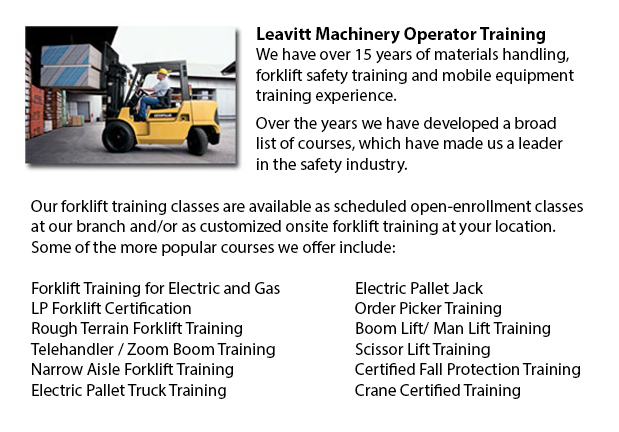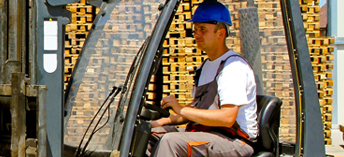
St Catharines Forklift Certification Schools - Forklift Certification is mandatory in North America. Hence, forklift training programs are necessary both for businesses and for people looking for jobs in industries as operators of forklifts. Forklift training focuses on health and safety issues involved in forklift use. Safety issues affect both the operator of the forklift and workers and other people who are in close proximity to the forklift. Businesses can be subject to penalties if they are caught with drivers who are un-certified during a check up. There are various compelling reasons why companies should comply with forklift standards.
The majority of federal, state, and provincial rules require a worker evaluation of the skills essential for forklift safety before the employer signs off that the worker is certified. There are several ways to acquire forklift training for employees, like online forklift training. However, employers should be aware that forklift certification training is not "just a test". Correct forklift training should contain various fields of study, including theory and hands-on practice. Rules do not need employers to have an outside organization to certify forklift drivers.
The suggested curriculum for a quality forklift certification service consists of both classroom training and an on-site component. Classroom training usually features informative sessions with power point presentations, videos, models and discussions. Students usually must write a test to check for comprehension of subject matter. Certificates of completion are given upon successfully completing the class.
The use of the equipment evaluation needs the trainee to know the job site dangers, pre-operational equipment inspection, operational instruction and a pass/fail operational test.
Training usually covers the following subject areas: Understanding legislations and regulations; Controls & Instrumentation; maneuvering and Steering; Engine maintenance and Operation; Fork and Attachment Limitations, Visibility; Rated Capacities, Stability, Maintenance & Inspection; Load Manipulation; Refueling; Pedestrians, and Dangerous Locations & Rough Terrain Operation. There are even training courses available for workers who are transitioning to new job positions.
-
St Catharines Heavy Equipment Training Schools
St Catharines Heavy Equipment Training Schools - When selecting an operator training course, there are a lot of heavy equipment training schools to choose from. To be able to ascertain the qualifications you will attain, it is very important to explo... More -
St Catharines Heavy Equipment Operator Training
St Catharines Heavy Equipment Operator Training - Heavy equipment operator training facilities that offer quality standards within the business, offering field performance work and additional machine training are really sought after training features... More -
St Catharines Forklift Training Programs
St Catharines Forklift Training Programs - Are you looking for work as a driver of a forklift? Our regulatory-compliant mobile equipment operator training offers instruction in kinds of forklifts, pre-shift check, fuel kinds and handling of fuels, an... More -
St Catharines Heavy Equipment License
St Catharines Heavy Equipment License - A heavy equipment license can be obtained by taking a certification and preparation course at a private training school or a vocational school. This license would qualify you to operate various types of heavy e... More -
St Catharines Overhead Crane Safety Training
St Catharines Overhead Crane Safety Training - Overhead crane safety training equips operators with skills and knowledge regarding crane safety precautions, accident avoidance, materials handling, and equipment and stock protection. Trainees will lea... More -
St Catharines Scissor Lift Training
St Catharines Scissor Lift Training - Scissor lifts should be operated proficiently to be able to protect the safety of the equipment and the wellbeing of others within the workplace. Operators who are skilled are trained to drive the specific type o... More -
St Catharines Telescopic Training
St Catharines Telescopic Training - Telescopic Handlers are a kind of forklift, normally known as telehandlers. This machine has been increasing in popularity due to its greater lift heights and its versatility. It is often preferred over the convent... More -
St Catharines Boom Lift Certification
St Catharines Boom Lift Certification - Utilizing elevated work platforms allow for maintenance operations and work to be carried out at elevated work heights which were otherwise unreachable. Boom Lift Certification Training educates workers about t... More

Forklift Certification St Catharines
TOLL FREE: 1-888-254-6157
St Catharines, Ontario
forkliftcertificationstcatharines.com/
Email Us
About Us


